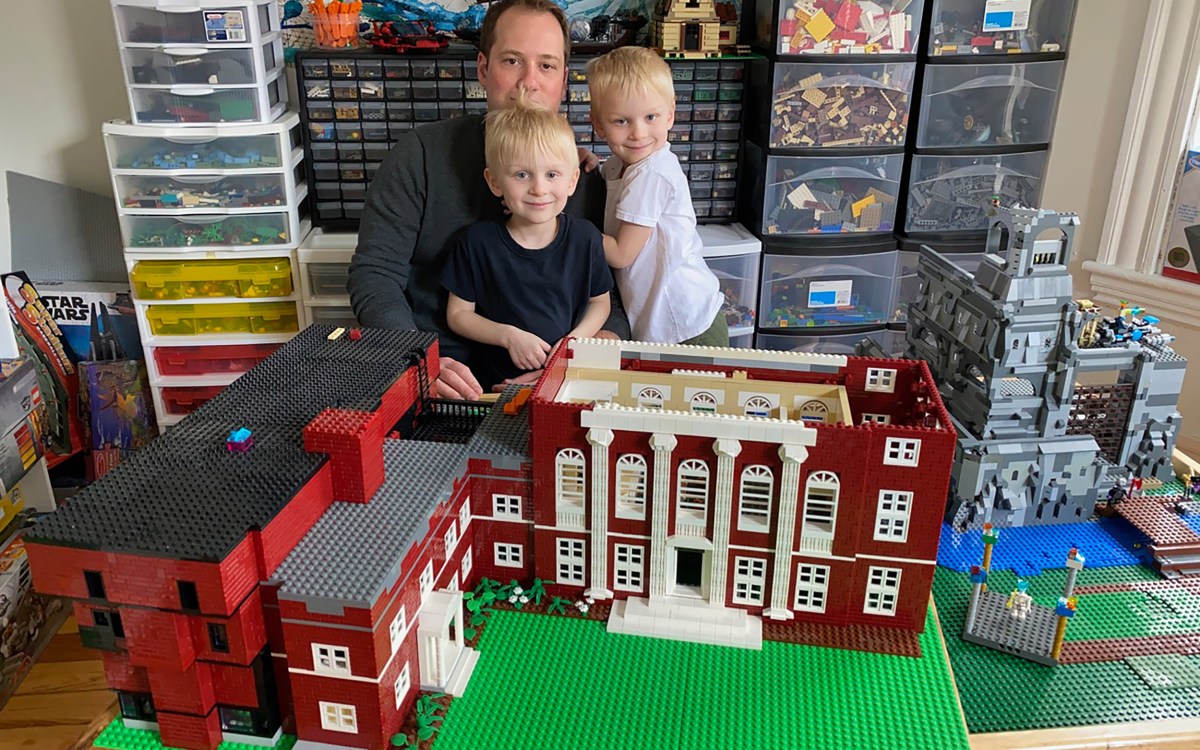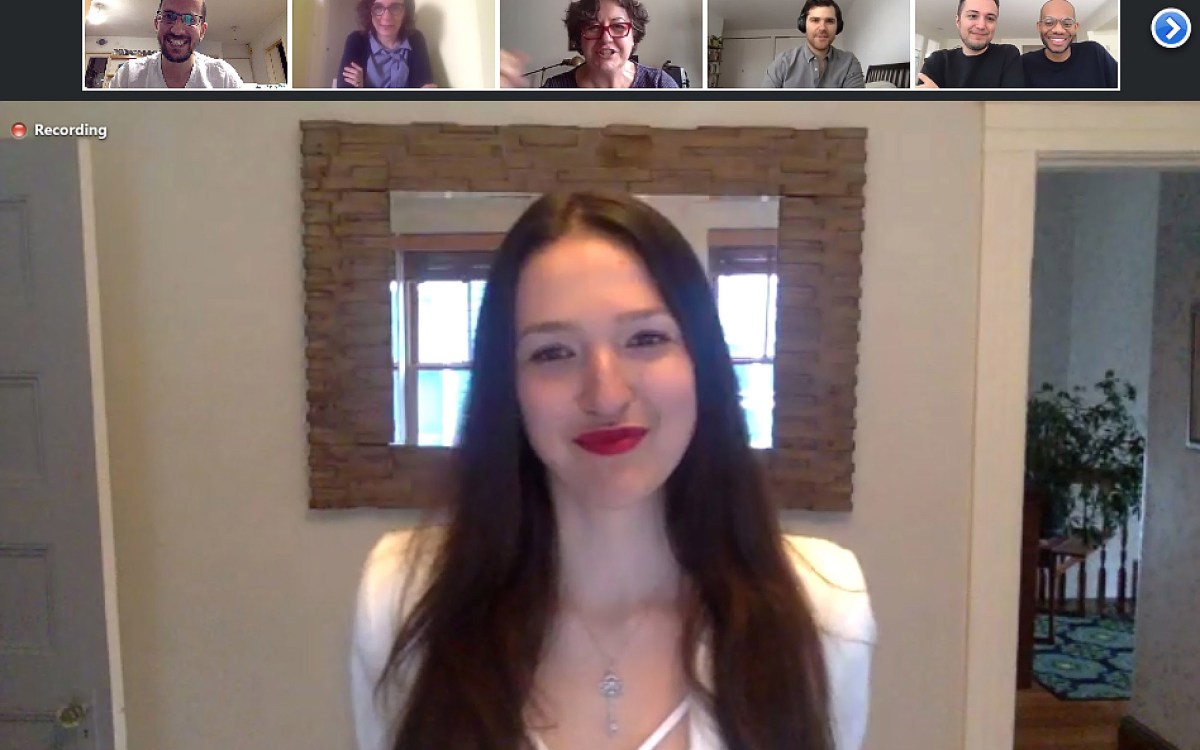
Photo illustration by Judy Blomquist/Harvard Staff
Finding creative ways to maintain campus bonds remotely
Some groups have retooled old school rituals, while others have created new ones
Campus friend groups remain close, even if not geographically. So they’ve had to make adjustments to keep in touch. For some it was merely a matter of going remote with their regular weekly gathering; others discovered whole new reasons to get together. This is how three groups did it: one adapted, one reimagined, and one very recently crafted.
An event adapted
Siva Emani ’21, a co-president of Harvard Dharma, began the Hindu group’s Zoom session with a check-in question, the typical starting point for their Friday evening social and worship gathering: “What’s the place you wish you could be at right now?”
Of the more than 25 participants, many named spots on campus — the second floor of Cabot Library, IM soccer on Cumnock field. But several mentioned one in particular: the Dharma prayer space in Canaday Hall.
Over time, many students have brought idols from home to add to the space, allowing students to become exposed to deities from various regions.
Photo courtesy of Shivam Bhatt ’20
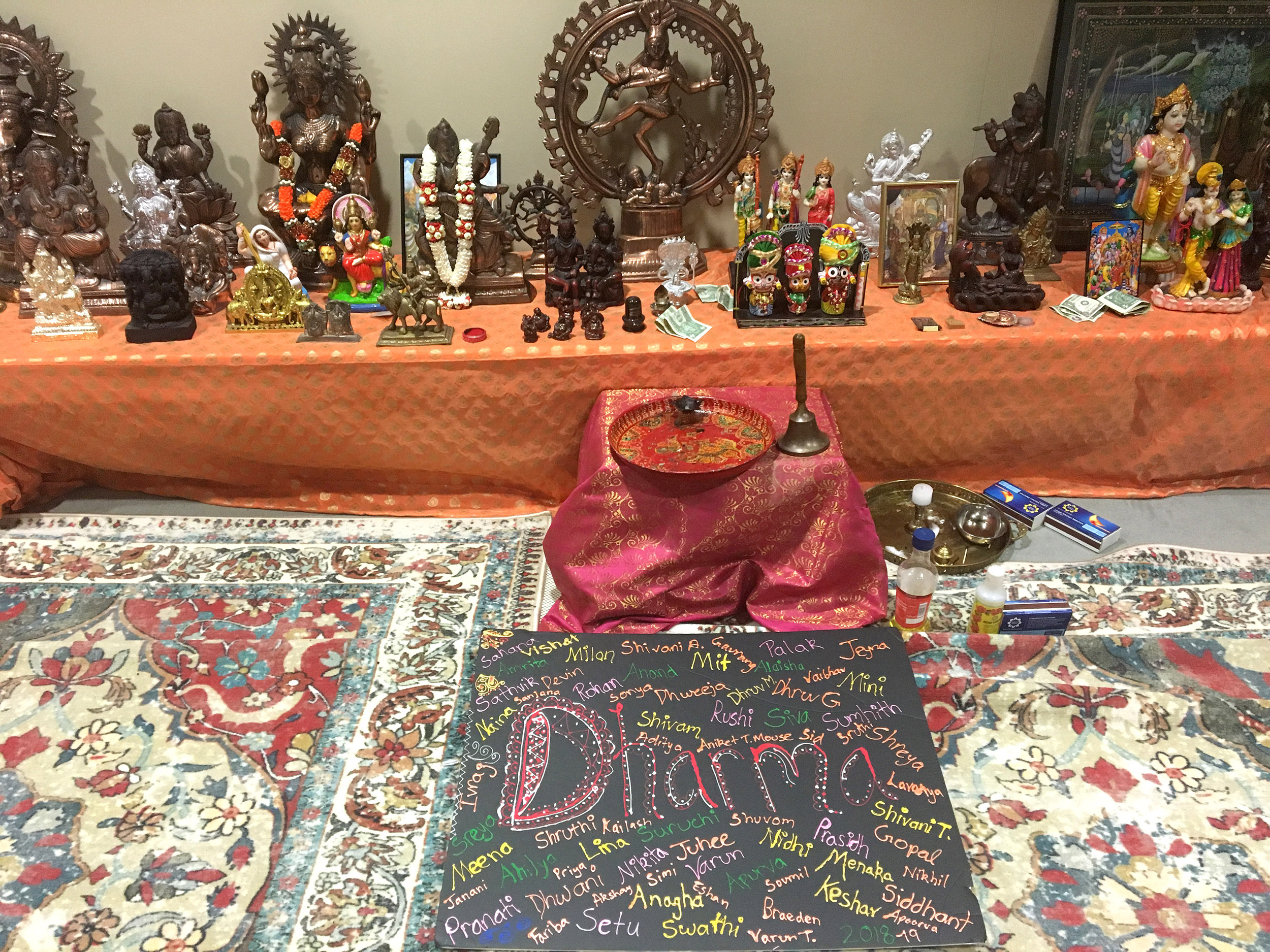
On Friday evenings during the school year, Harvard Dharma gathers in Canaday Hall for aarti, a worship session where light is offered to various deities, represented by physical idols. It begins with a member lighting a candle (diya), placing it atop a tray, and briefly circulating the flame before the idols, while the group sings “Om Jai Jagdish Hare.” The tray is passed to other members, each of whom can take a turn presenting the light to the idols and receiving a blessing.
The challenge? How to turn aarti into a virtual ritual. Co-presidents Emani and Mit Patel ’21 pondered the options. Having each participant work with their own tray and candle might detract from the central, community focus. They decided that the members should take turns hosting aarti from their homes.
Members of Harvard Dharma continue to worship and socialize weekly, now through Zoom.
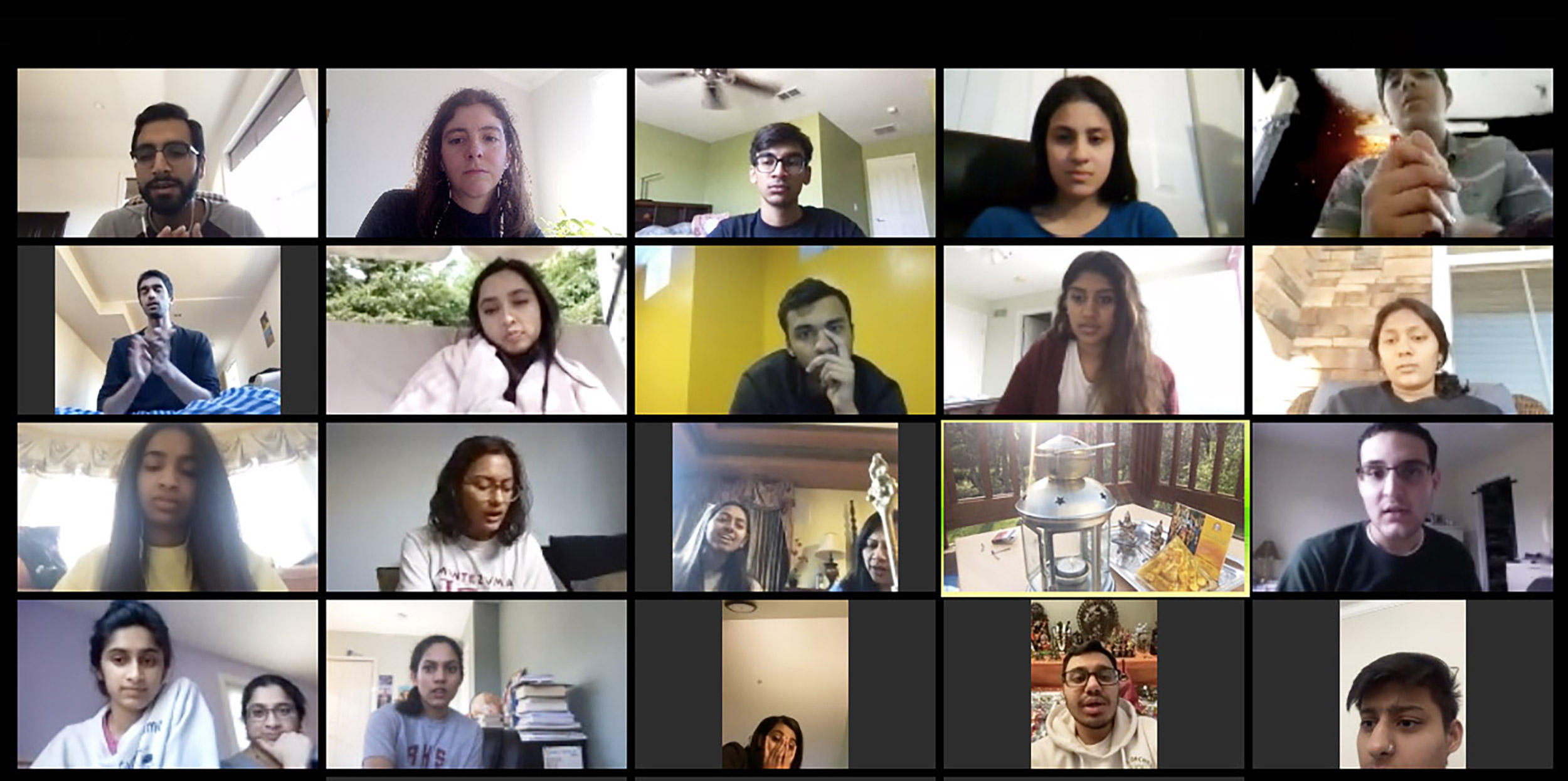
On April 3, Pranati Parikh ’21 sat in front of her family’s designated shrine. Her mother, Purvi Parikh, offered the aarti, while Pranati sang and her brother, Parth, played the drum (tabla). Once the devotional chant ended, Parikh’s mother walked the candle to the camera and waved her hand over it to direct the flame toward the screen, blessing the students tuning in.
Purvi Parikh, mother of student Pranati Parikh, offering aarti.
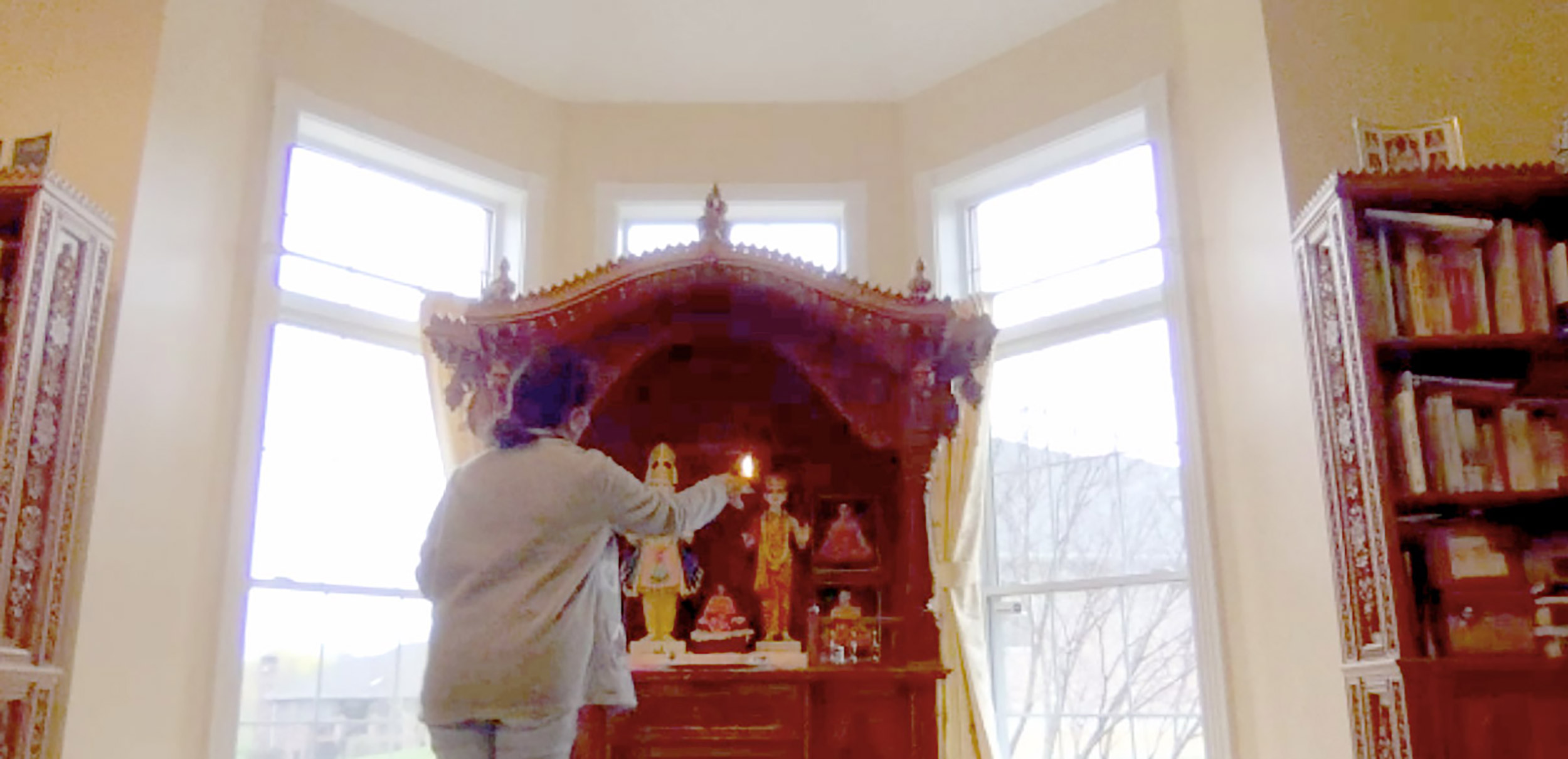
Harvard Dharma has continued to tweak the ceremony. After the first Zoom aarti, for instance, it became apparent that it would sound much less chaotic if only the host’s singing was projected.
Patel says that a silver lining to the new arrangement has been the chance to see the home traditions of Dharma members, and the specific idols that their families possess. And, Patel says, “It must be cool for parents to see their children continue their traditions in college.”
After aarti, the group either does an activity or breaks up into small group discussions. A recent conversation focused on community and faith during the COVID-19 pandemic. Lowell House’s Varun Tekur ’22 expressed his gratitude for two values that Harvard Dharma and Hinduism encourage: “Calmness and community. Those values are emphasized in this time.”
An event reimagined
Evening tea is a longstanding Thursday tradition at Lowell House. With residents scattered back to their hometowns, senior Meredith Pong came up with a plan to fill the void: In place of tea, she would serve up a baking tutorial.
As assistant manager of the tea, Pong was the ideal candidate for this. In that role she led a handful of student bakers in preparing savory and sweet confections to feed 200 people each week. Last summer she interned at Ovenly bakery’s kitchen in Brooklyn, N.Y. She has taken Harvard’s “Science and Cooking” course, and binges on New York Times recipes and Bon Appétit videos.
Meredith Pong preparing for Lowell House Tea. Typical fare includes cucumber sandwiches, baked brie, scones, monkey bread, and chocolate cake.
Photo by Kevin Stephen
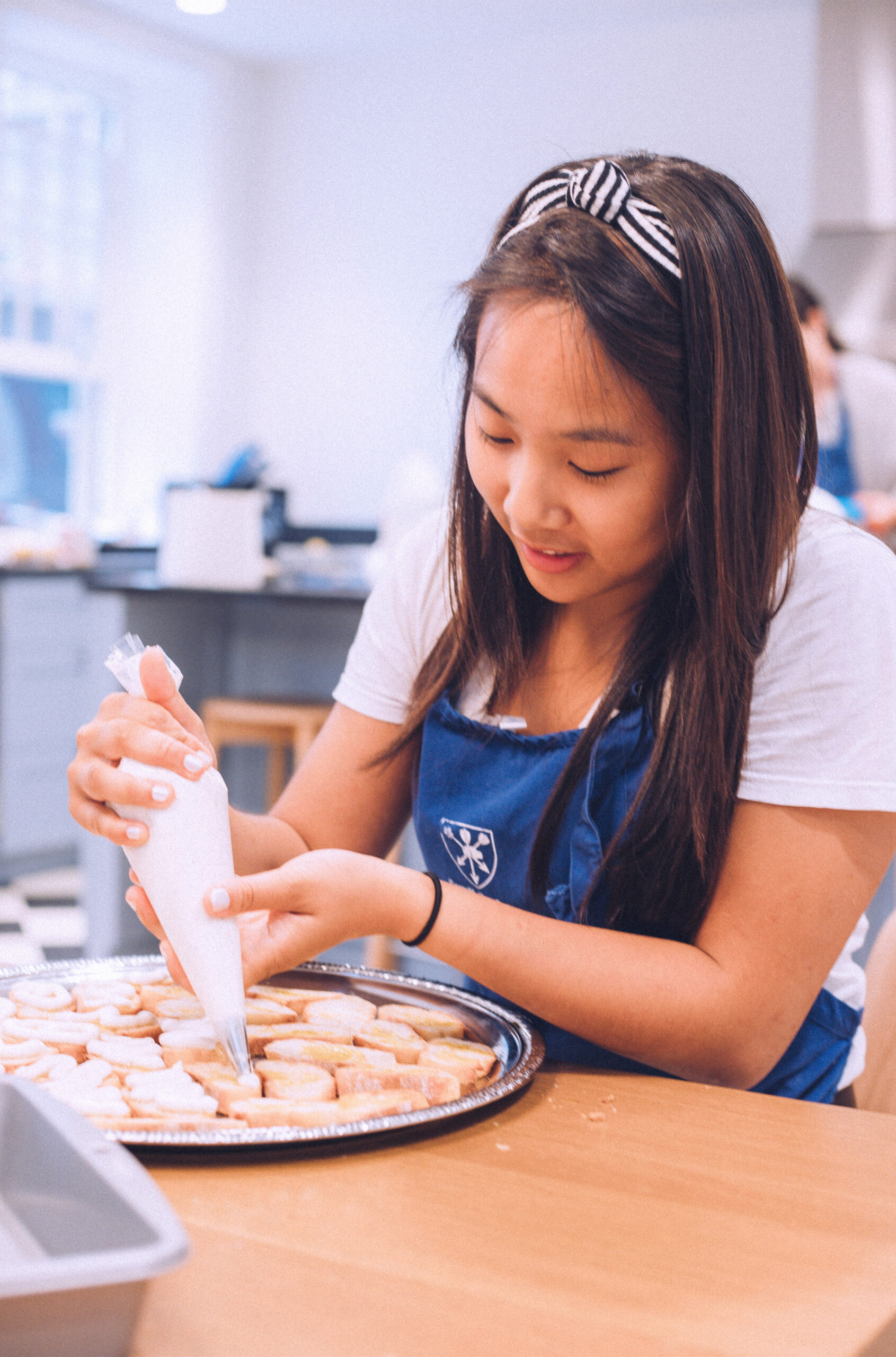
And her reputation is sterling. Nina Zipser, a Lowell Faculty Dean, has emailed her with baking questions, most recently to ask why her custard curdled. (Pong suspects that “the heat was too high, causing all the water to evaporate and make the proteins curl up.”) She also has the endorsement of Beth Terry, Lowell House Administrator, who told Pong, “If I ever get married again, I want you to make that chocolate cake at my wedding.”
Pong emailed the Lowell House list with her plan and received more than 30 enthusiastic responses. In her note, she suggested some flavors for an upcoming scones session: rosemary and currant, chocolate chip, blueberry and lemon, honey, cheddar chive, cheddar mustard — “really whatever people had in their pantry or could get their hands on.”
Pong is conscious of choosing recipes that don’t require complex ingredients, since many students across the world are following stay-home guidelines. The first week she made chocolate chip cookies but went beyond basic recipe instructions. She discussed the importance of salt, how to properly cream butter and sugar, how to butter a pan, and how to achieve the desired chewy or crispy texture.
On a recent Thursday, she convened a group for scones. Within minutes, Pong was fielding questions from Lowell peers on Zoom:
“I don’t have heavy cream. Would replacing it with Greek yogurt or condensed milk work?” (Yogurt!)
“For the rosemary, do I want the whole leaf or chopped pieces?” (Whole pieces!)
Pong instructed viewers to squish butter between their thumbs and forefingers to a lima bean size. Then, let the dough rest in the refrigerator. “You want the flour to have time to hydrate and let all the gluten that’s been formed by the mixing relax. That way it’s less chewy.” Someone asked: “Can I see what your dough looks like?” prompting Pong to hold her bowl to the screen.
Students donned aprons and crimson sweatshirts during the first Zoom session. Lowell House Faculty Deans were in attendance.
Photo courtesy of Kaitlyn Lee
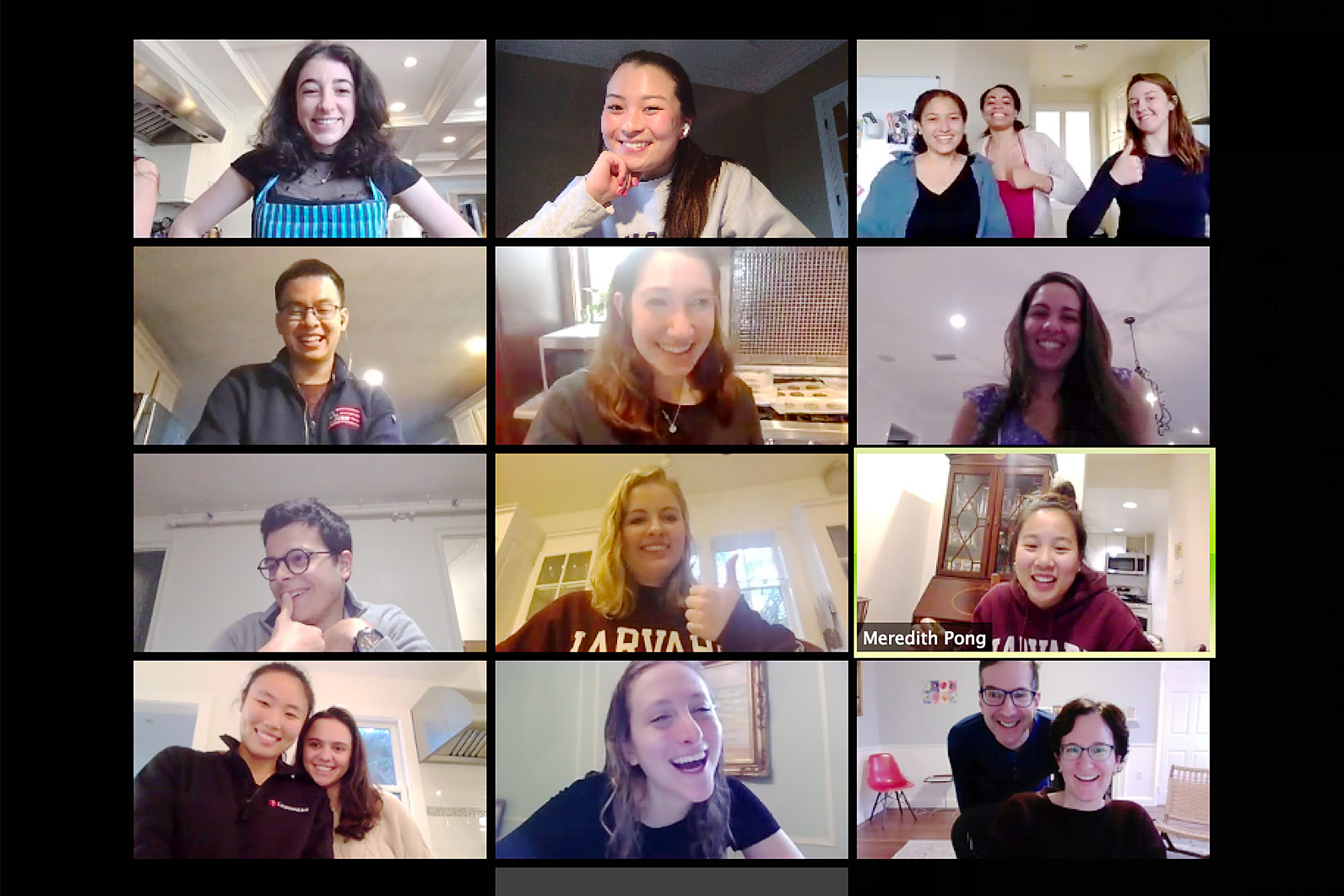
During tasks, the conversation went from upcoming housing day ideas to surveying how many people use TikTok. At one point, students brainstormed what they should bake in upcoming weeks. Someone suggested black bean brownies — not only healthy, “it’s the perfect apocalypse food.”
Click here for the Ovenly Currant Rosemary Scones recipe.
An event fully crafted
Beyond those activities that have spun off existing ones, some have emerged on their own. Pforzheimer House residents have created many new online groups, and one of them caters to a very specific interest: Chinese costume dramas.
Tutor Daniel Frim and senior Ying-ke Chin-Lee first began talking about East Asian cinema while eating Zinnekan’s waffles. Frim had hosted a final study break in Pforzheimer before students left campus — and the conversation they’d struck up seemed like the perfect interest to explore amid the pandemic diaspora.
Frim and Chin-Lee emailed the Pforzheimer list inviting any and all to join them for Friday afternoon Zoom viewings. For the first week, Chin-Lee selected the first episode of the TV series “The Eternal Love” to share with her peers. In Zoom’s chat box, Chin-Lee mentioned that the drama is pretty cheesy, and knows it, to which Frim responded, “Cheesy is just what I need these days!”
Pforzheimer House residents viewing the first episode of “The Eternal Love.”

To ensure coordinated viewing, Frim used the very high-tech method of a verbal countdown to signal when all viewers should press play on their YouTube video links.
For a contrasting second viewing, Chin-Lee chose “Ashes of Love,” a more fantastical example. In the Flower Realm, a goddess gives birth to a daughter who is supposed to be prevented from falling in love. The plot thickens as this daughter is caught in a love triangle.
Scene from the Chinese TV show “Ashes of Love,” the selection of the week.

Afterward, Frim questioned Chin-Lee about elements that viewers not versed in Chinese costume dramas might miss. Before the discussion ended, she named a few favorites, including adaptations of two classic novels, 1994’s “Romance of the Three Kingdoms” and 1987’s “Dream of the Red Mansion.” Anyone looking for entertainment suggestions while at home should take note.




